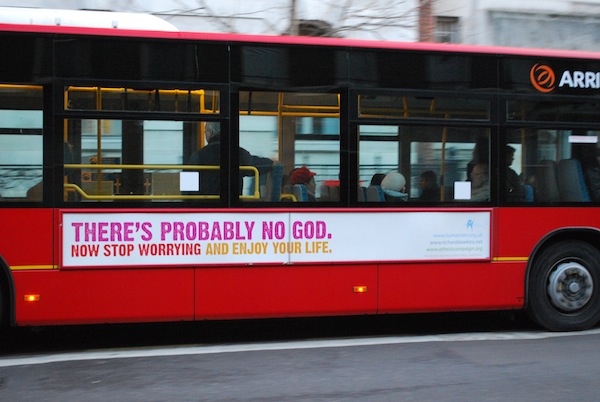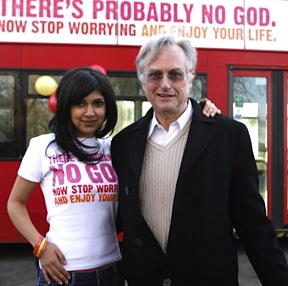
Another wonderful passage from the introduction of our 2014 NYC Conference speaker’s Unapologetic: Why, Despite Everything, Christianity Can Still Make Surprising Emotional Sense.

Take the well-known slogan on the atheist bus in London. I know, I know, that’s an utterance by the hardcore hobbyists of unbelief, but in this particular case they’re pretty much stating the ordinary wisdom of everyday disbelief. The atheist bus says: “There’s probably no God. So stop worrying and enjoy your life.” All right: which word here is the questionable one, the aggressive one, the one that parts company with recognisable human experience so fast it doesn’t even have time to wave goodbye? It isn’t “probably”. New Atheists aren’t claiming anything outrageous when they say that there probably isn’t a God. In fact they aren’t claiming anything substantial at all, because, really, how would they know? It’s as much of a guess for them as it is for me. No, the word that offends against realism here is “enjoy”. I’m sorry – enjoy your life? I’m not making some kind of neo-puritan objection to enjoyment. Enjoyment is lovely. Enjoyment is great. The more enjoyment the better. But enjoyment is one emotion. To say that life is to be enjoyed (just enjoyed) is like saying that mountains should only have summits, or that all colours should be purple, or that all plays should be by Shakespeare. This really is a bizarre category error.
But not necessarily an innocent one. Not necessarily a piece of fluffy pretending that does no harm. The implication of the bus slogan is that enjoyment would be your natural state if you weren’t being ‘worried’ by us believers and our hellfire preaching. Take away the malignant threat of God-talk, and you would revert to continuous pleasure, under cloudless skies. What’s so wrong with this, apart from it being total bollocks?
…[S]uppose, as the atheist bus goes by, you are poverty stricken, or desperate for a job, or a drug addict, or social services have just taken away your child. The bus tells you that there’s probably no God so you should stop worrying and enjoy your life, and now the slogan is not just bitterly inappropriate in mood. What it means, if it’s true, is that anyone who isn’t enjoying themselves is entirely on their own. …It amounts to a denial of hope or consolation on any but the most chirpy, squeaky, bubble-gummy reading of the human situation. St Augustine called this kind of thing ‘cruel optimism’ 1,500 years ago, and it’s still cruel.
A consolation you could believe in would be one that wasn’t in danger of popping like a soap bubble on contact with the ordinary truths about us. A consolation you could trust would be one that acknowledged the difficult stuff rather than being in flight from it, and then found you grounds for hope in spite of it, or even because of it, with your fingers firmly out of your ears, and all the sounds of the complicated world rushing in, undenied.

[ed note: for Francis’ take on the flipside of cruel optimism, click here.]

COMMENTS
2 responses to “Francis Spufford on the Cruel Optimism of an Atheist Bus”
Leave a Reply













Yep. And ironically, the only way to stop worry and enjoy life is to trust Jesus.
[…] What Strawson argues, though, is true to Christians and Gentiles alike — that there is a cruel optimism in living as though on the inside track of this narrative. So many narratives (lives) are cut way […]